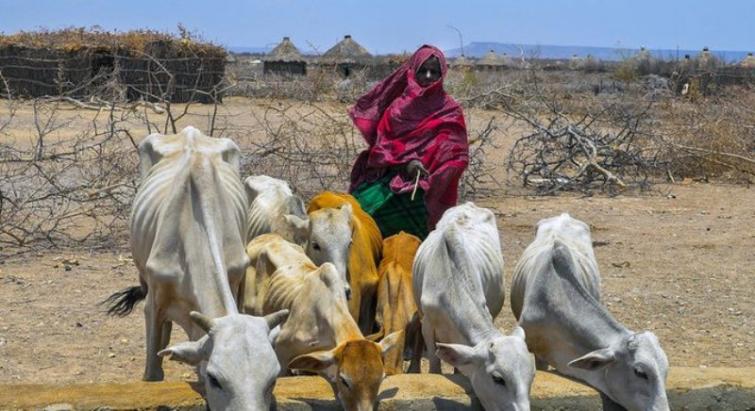
Keep critical food supply chains operating to save lives during COVID-19, urges new UN-backed report
New York/IBNS: A new study on food insecurity by an alliance of UN, governmental, and non-governmental agencies analyzes what is fueling global food crises and examines how, among other emergencies, the COVID-19 pandemic is perpetuating downward cycle for millions.
In 2019, around 135 million people across 55 countries experienced acute food insecurity, which required urgent food, nutrition, and livelihoods assistance for survival, according to the joint news release issued on Tuesday in Rome by the Global Network Against Food Crises.
As challenges to food security multiply & cross borders, we must work together to protect the most vulnerable https://bit.ly/3bv6j8k #GlobalFoodCrises #FightFoodCrises
“But these numbers are just the tip of a larger iceberg”, according to the Global Network.
Within 47 of these countries, an additional 183 million people were found to be living in so-called “stressed conditions” – or on the verge of slipping into acute hunger if hit with a shock, such as the COVID-19 pandemic.
Moreover, the report revealed that in those 55 food-crisis countries, 75 million children are stunted and 17 million suffer from wasting or when muscle and fat tissue waste away. Nine million are in the 10 worst-food-crises countries.
“We cannot allow anything – not COVID-19, not anything, to prevent us” from delivering assistance, the Global Network stated.
Keep food chains operating
Countries in food crises are particularly vulnerable to the coronavirus.
Already weakened by hunger, their compromised health renders them less able to fend off the virus and they are ill equipped for any shocks on their economies or food systems.
“We must keep critical food supply chains operating, so people have access to life sustaining food”, the study said, stressing the urgency of maintaining the delivery of humanitarian assistance “to keep people in crisis fed and alive”.
Because most countries in the Global Report lack the means to support their citizens with healthcare or economic safety nets in response to COVID-19, the study emphasized: “We must all step up and help. We are all in this together”.
Africa hardest hit
The report showed that countries in Africa remain disproportionally affected by acute food insecurity.
In order of severity, the 10 worst food crises last year were Yemen, the Democratic Republic of the Congo, Afghanistan, Venezuela, Ethiopia, South Sudan, Syria, Sudan, northern Nigeria, and Haiti.
Together they constituted 88 million acutely food insecure people and accounted for 65 per cent of all people in acute food insecurity.
The report detailed that conflict and insecurity drove 77 million people into crisis while another 34 million were affected by extreme weather and an additional 24 million people were battered by economic shocks.
Stemming the damage
In hotspots, humanitarian contributions to food security, agriculture and nutrition increased from $5.3 billion in 2016 to $6.5 billion in 2018 – in many countries far outweighing that of development assistance.
The Global Network against Food Crises pledged its commitment to addressing both the well-known drivers of acute food insecurity and malnutrition along with potential threats, like COVID-19.
The agencies acknowledged that sustainable economic growth, resilient livelihoods and sustained peace require a holistic approach that involves both humanitarian and development interventions.
Interventions in support of food security, nutrition and agricultural livelihoods address not only the symptoms of food crises, but their root causes.
“If we let people’s livelihoods be lost as a result of the COVID-19 pandemic, once the health crisis has eased, we will have major problems to deal with”, according to the Global Network.
Global Network against Food Crises pledge
Accelerate efforts to tackle root causes of hunger.
Address data gaps that impede collection, reduce response effectiveness and stall development.
Strategically invest in food security at country and regional levels.
Advocate for dialogue and political action to spotlight recurrent issues that obstruct food security and drive food crises.
Improve humanitarian and development coordination to maximize impact and address root causes of protracted crises.
Go beyond food to address people’s vulnerability before, during and after crisis.
“It is both more humane and strategically smarter to protect and sustain agricultural and rural livelihoods before food crises hit, rather than rebuild them”.
Support Our Journalism
We cannot do without you.. your contribution supports unbiased journalism
IBNS is not driven by any ism- not wokeism, not racism, not skewed secularism, not hyper right-wing or left liberal ideals, nor by any hardline religious beliefs or hyper nationalism. We want to serve you good old objective news, as they are. We do not judge or preach. We let people decide for themselves. We only try to present factual and well-sourced news.







